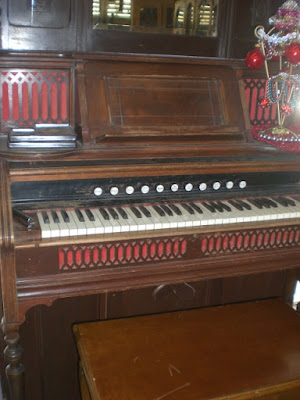If trinkets could talk, they might tell quite a story. Maybe a dusty story of life before they were “left behind” when their owner downsized or passed away. I sometimes wonder about their “history” when I pass by these shelves at a local thrift store. I'm reminded of Paul's advice to Timothy: “We brought nothing into the world, and we can take nothing out of it” (1 Timothy 6:7). Or as someone wagged, “You don't see a U-Haul following a hearse.”
I have some décor and heirloom items around our home, most of them gifts. But cleaning out my parents' home after their deaths put a check in my heart of having too much “precious stuff.” My mother collected dozens of salt and pepper shakers! They sold for a pittance to another “collector.” Ditto china cup and saucer sets that were rarely used but displayed behind a glass case. My child's “start” on collecting was felt triangular pennants from places we visited on vacation. (Remember those?) They once filled a wall in my childhood bedroom. Now they're probably in some landfill. Oh, yes, I had a “birth month” ceramic angel. (Remember those? They're still around, often advertised in the ad-filled “magazine” of many Sunday papers.)
Someday, somebody else will have to dispose of “stuff” I left behind. None of us know when death will come. My retired-teacher-husband is starting to see obituaries of his former students. One was recently killed in a traffic accident, but the obituary mentioned that she had recently accepted Christ as her Savior.
Sometimes it helps to read about how godly people of the past anticipated their deaths and eternal life. I found this quote about eternity by John Baillie (Scottish theologian and ecumenical churchman, 1886-1960) both encouraging and profound:
Not even the most learned philosopher or theologian knows what it is going to be like. But there is one thing which the simplest Christian knows—he knows it is going to be all right. Somewhere, some-when, somehow we who are worshiping God here will wake up to see Him as He is, and face to face; but where or when we know not, or even whether it will be in a “where” and a “when,” that is, in space and time at all.
No doubt it will be utterly different from anything we have ever imagined or thought about. No doubt God Himself will be unimaginably different from our present conception of Him. But He will be unimaginably different only because He will be unimaginably better. The only thing we do certainly know is that our highest hopes will be more than fulfilled, and our deepest longings more than gratified. (1)
It will not be a life enhanced by trinkets, but by the pure worship of our holy, awesome God.
(1) John Baillie, Christian Devotion (New York: Charles Scribner's Sons, 1962), p. 44, cited in Elton Trueblood, The Lord's Prayer (New York: Harper and Row, 1965) p. 92.




